(完整word版)外研版一年级起点第三册重点词组和句子
(完整word版)外研版小学英语语法总复习知识点归纳

(完整word版)外研版小学英语语法总复习知识点归纳外研版小学英语语法总复知识点归纳一、时态1.一般现在时(1)表示经常发生的动作或事情,通常用“usually通常,often常常,every…每…。
sometimes有时,always总是,”等词。
(2)基本结构:主语I / You / We / They /He / She / It肯定句:主语+动词原形或动词第三人称单数形式否定句:主语+don’t + 动词原形或者doesn’t + 动原一般疑问句(Yes/No) Do…。
Yes。
I do.No,I don’t.Does…(动词原形)…?Yes,he/she does。
No,he/she doesn’t.特殊疑问句What do …。
How does she…(动词原形)…?(3)动词第三人称单数方式(同名词单数酿成复数办法不异)1.普通情形+s如:walk-walks2.辅音字母+y结尾去y +ies fly-flies3.结尾是s。
x,sh。
ch +es watch-watches4.结尾是0 +es do-does。
go-goes5.特殊have-has2.现在进行时(1)表示正在发生的动作,通常用“now现在。
look看,XXX听”.(2)根本方式: be +动词-ingeg: I am(not) XXX.You/We/They are(not) reading。
He/She/It is(not) eating.What are you doing。
Is he reading?(3)动词的目前分词方式(动词+ing)普通情形+ing walk—walking末端是不发音的e-e+ingcome—coming重读闭音节双写末了一个字母+ingswim-swimming。
run-running3.一般过去时(1)表示过去已经发生的事情,通常用“last …上一个…。
just now刚才,many years ago许多年前,XXX昨天”等词。
外研社一年级起点三下英语知识清单

外研社一年级起点三年级下册知识点 aliu 整理第一课(一般将来时)1、如何描述人物的性格特点.句型结构:主语+be动词+表示性格特点的形容词.Be动词应随主语的人称和数的变化而变化.表示人物性格特点的形容词有:shy腼腆 quiet文静的 naughty淘气 clever聪明 nice友好,亲切 a bit+形容词有点...例句: I’m a bit quiet.我有点文静.She’s very nice.她很友好.人物外貌描写:某人+be动词{变化} + 表示外貌特征的形容词 big,I am very tall.我很高. My sister is beautiful.我姐姐很漂亮.You are thin. 你很瘦.某人+ have / has got (a/an) +形容词+名词.She has got two big eyes.她有两只大眼睛.I have got long hair.我梳着长发.2、介绍某人的句型句型结构:This is +人名,在人名前不加任何冠词.或者 This is +形容词性物主代词+称呼This is Maomao. 这是毛毛.3、表达自己打算帮助某人的句型句型结构:I’m going to help + 某人.某人若为人称代词,要用宾格形式.I’m going to help her.我打算帮助她. help you帮助你help him帮助他4、含有begoingto的一般将来时,表示计划、打算做某事,常与 tomorrow ,next week ,the day sfter tomorrow 等时间状语连用.句型结构:主语+ begoingto + 动词原形 (+其他)I’m going to do my homework. 我打算做家庭作业.5、如何表达自己很乐于助人I’m helpful.我很乐于助人.He/she is helpful.他/她很乐于助人 .They are helpful.他们/她们很乐于助人.6表达某人不会做某事的句型主语+can’t +动词原形(swim,sing,dance...)+其他.can’t 是 can not的缩写形式,意思为“不会”,与动词原形搭配使用.What can you do 你们会做什么I can sing. 我会唱歌.I can’t sing,but I can play the piano.我不会唱歌,但我会弹钢琴.This little girl can’t do her Maths.这个小女孩不会做数学题. (Science科学、)第二课1、如何运用形容词描述事物句型结构:主语+be动词+形容词,形容词前可以加 very (非常) ,quite(相当)等.This park is new. It’s very beautiful. And it’s very big. 这个公园是新建的.它非常漂亮.并且它非常大.2、表达对方将看见某(些)事物的句型句型结构:You’ll see +某(些)事物. will 是一般将来时的标志词之一.与动词原形搭配使用.You’ll see tigers and lions. 你将看见老虎和狮子.第三课1表达某些人将去某地的句型句型结构:主语+will go (to)+地点.这是一个一般将来时的句子,用于表达将要去某地. will 没有人称和数的变化,与其搭配的动词用原形.地点若为副词 home、 there ,则省略介词 to.We’ll go to the library.我们将要去图书馆. We’ll go home.2、含有will一般将来时will 没有人称和数的变化,与其搭配的动词用原形.句型结构:肯定句主语+will+动词原形(+其他).I’ll make a birthday cake for hi m. 我将要为他制作一个生日蛋糕.否定句主语+ won’t +动词原形(+其他).I won’t call you.我将不会给你打.疑问句:will + 主语 + 动词原形(+其他)Will you go with me你将要和我一起去吗3、表达将要做某事的句型主语+will+动词原形(+其他)我爸爸明天将要去钓鱼.My father will go fishing tomorrow.4、如何询问对方周末计划问句:What will you do this weekend答语:I/We will+动词原形(+其他)I/We will go swimming. 我将要去游泳.5、如何询问某人是否将要做某事此问句是will开头的一般将来时的一般疑问句.问句:W ill + 主语 + 动词原形(+其他)答语: Yes,主语+will. / No ,主语+ won’t.6、询问我们是否将要做某事的句型问句:Will we + 动词原形(+其他)答语: Yes , we will. / No ,we won’t.第四课1、如何表达某人将要做某事某人 + will + 动词原形(+其他)Will为情态动词,与动词原形搭配使用,没有人称和数的变化.在一般将来时的句子中,常有 tomorrow(明天),next year(明年), next month (下个月) ,the day after tomorrow (后天),soon(不久)等时间状语. I will have a party with my friends. 我将和我的朋友们举办一个聚会.2、了解基数词英语中数词包括基数词和序数词.表示人或事物的数量时用基数词.全59页巧学妙计:1到12分别记,13到19都带-teen.20到90整十数,-ty结尾是后缀.要是表示几十几,连字符整十连个位.要是表示几百几,hundred之后加and立.基数词:1 one 2 two 3 three 4 four 5 five 6 six 7 seven 8 eight 9 nine10 ten 11 eleven 12 twelve 13 thirteen 14 fourteen 15 fifteen 16 sixteen17 seventeen 18 eighteen 19 nineteen 20 twenty 21 twenty-one 22twenty-two 23 twenty-three 24 twenty-four 25 twenty-five 26 twenty-six27 twenty-seven 28 twenty-eight 29 twenty-nine 30 thirty3、询问某人询问事物数量的句型问句: How many + 可数名词复数答语:基数词+(可数名词单数或复数)How many monkeys Eleven monkeys. 十一只猴子第五课1、询问对方是否将要做某事的句型句型结构问句: Will you +动词原形(+其他)答语: Yes,I/we will. No,I/we won’t.2、Why not 的用法为什么不了3、如何描述自己将在星期几做某事句型结构: On +星期名称,I’ll + 动词原形(+其他)例句:在星期日你们将要做什么What will you do on Sunday在星期日,我将和我的朋友们打篮球.On Sunday, I will play basketball with my friends.4、询问她是否要在星期几做某事.问句:Will he/she +动词(短语)原形+on+星期名称答语:Yes,he /she will. No,he /she won’t.表示在星期几,在星期名词前要加 on.星期天 day 、 Monday、 Tuesday、星期三 Wednesday、星期四 Thursday、星期五 Friday、星期六 urday.第六课1、here开头的句子.Here+主语(人称代词)+动词当句子主语是人称代词时,动词要置于主语之后. Here it is. 它在这儿.Here++动词+主语(名词)当句子主语是名词时,动词要置于主语之前.Here are your books.这些是你的书.2、提出行动建议的句型让他人与自己一起做某事.句型结构:Let’s +动词原形+其他Let’s draw a monster 让我们画一个怪物吧3、There be 句型见教材第七课1、询问某地是否有某人某物的句型.见教材问句:Are there +可数名词复数 +地点答语:Yes,there are./No,there aren’t.2、如何询问在某处的事物的数量问句:How many +可数名词复数 +are there +地点答语:There is /are +基数词./ 基数词.第八模块(一般现在时)1、描述今天是某个特殊日子的句型句型结构: It’s+日子+today. It’s Parents’Day today.今天是家长日. 常见节日的英文表达:2、描述某人努力学习的句型.时态是一般现在时,表示经常发生的动作、行为或存在的状态.若主语为第三人称单数,要用动词第三人称单数形式+s works.主语+work(s) hard. She (lingling)works hard.3、如何询问他人的性格特点.问句:Is+主语(第三人称单数)+形容词(+其它)答语:Yes,he/she is. /No,he/she isn’t.大明在课上淘气吗 Is Daming naughty in class不,他不淘气.No, he isn’t.4、如何评价他人的功课His /Her work is good. 他的功课很好.His /Her work is+形容词.5、如何表达某人对某事很满意.主语+be动词+happy with+其他.Be动词要根据主语的人称和数来确定.With是对于的意思.I’m happy with that. 我对那个很满意.6、如何描述他人很或非常擅长某学科.7、主语(第三人单数)+is (very /quite) good+学科.She’s very good at Maths.她非常擅长数学.表达某人不擅长某学科,在is的后面加 not .But she isn’t good at Art.但她不擅长美术.当我们想表达某些人某人非常擅长某学科时,be动词随着主语人称和数的变化而变化.I’m very good at English .They are quite good at Chinese .他们非常擅长语文.7、描述他人或其他人称不努力学习某学科的句型.主语(第三人称单数)+doesn’t work hard at +学科.Lingling doesn’t work hard at Science. 玲玲不努力学习科学.当主语不是第三人称单数时,在动词 work 前加 don’t.I (You / Lily and Mike )don’t work hard at English.第九模块(一般过去时)8、如何描述某人过去的外貌特征.主语+was/ wasn’t/were/weren’t +表示外貌特征的形容词(+then).描述某人过去的外貌特征时,时态要用一般过去时.Then 意思为“那时”,是表示过去的时间状语.Is 和 am 过去时是was ,否定式是 was not ,缩写成 wasn’t ;Are 的过去时是were ,否定式是 were not,缩写成 weren’t .My father wasn’t fat then.He was very thin.我爸爸那时不胖,他很瘦.1、如何描述某人现在的外貌特征,时态要用一般现在时.Be随主语人称和数的变化而变化.主语+is /am/are (not) + 表示外貌特征的形容词(+now)He is tall and strong now. 他现在又高又强壮.2、含有be 动词的一般过去时的句子肯定句:主语+was/were +其他. I was late yesterday.我昨天迟到了.否定句:主语+was/were not +其他.We weren’t late yesterday.我们昨天没迟到.一般疑问句:Was / were +主语+其他Were you ill yesterday 你昨天生病了吗Yes, I was. 是的,我生病了. /No,I wasn’t.不,我没生病.3、描述某人过去在某地的句型一般过去时,主语+was /were in/ at+地点. 主语是第一人称单数和第三人称单数时,be 动词用was,其他情况用were. 大地点用in,如在哪个城市,小地点用at.He was in Hong Kong.他在香港.I was with Daming at his home yesterday. 昨天我和大明在他的家里.第十模块1、询问对方过去是否在某地的句型.一般现在时问句:Were you+地点答语:Yes,I was/ We were . / No,I wasn’t /we weren’t.Were you on the second floor 你们刚刚在二楼吗 Yes,We were.是的,我们在.2、描述某人过去在几楼的句型序数词主语+ was/were on the +序数词+ floor .We were on the first floor. 我们刚刚在一楼.3、如何询问他人过去是否在某地Was Daming there大明在那里吗 No,he wasn’t.不,他不在.问句:was+主语(第三人称单数)+地点答语:Yes, he/she was. /No,he/she wasn’t.4、如何描述某物过去所在的位置.They were here last Sunday.上个星期日它们在这里.hey were under the bed yesterday .昨天它们在床下面.5、询问某物现在所在的位置Where are the vegetables蔬菜在哪里Where is /are the+某物Where are the cakes 蛋糕在哪里。
外研版Book1 Module3 重点单词讲解(思维导图word版)
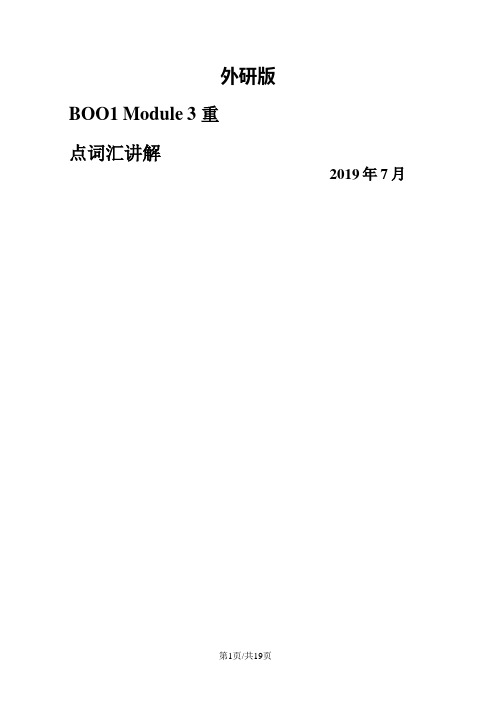
外研版BOO1 Module 3 重点词汇讲解2019 年 7 月第1页/共19页第2页/共19页a police helicopter 警用直升机a helicopter pilot直升机驾驶员第3页/共19页n.a distance of 200 kilometres 200 公里的距离What's the distance between New York City and Boston/from New YorkCity to Boston? 纽约市离波士顿有多远?In the US, distance is measured in miles.在美国,测量距离以英里作单位。
distanceWe saw lights in the distance. 我们看到了远处的点点灯光。
in/into the distance 在远处;在远方Alice stood staring into the distance. 艾丽斯站着凝视远方。
词组keep sb at a distance对…冷淡;同…疏远;与…保持一定距离go the (full) distance(比赛)打完全场,赛满全局Nobody thought he would last 15 rounds, but he went the full distance.谁都以为他坚持不到15 个回合,可是他却打完了全场。
第4页/共19页第5页/共19页leave a thing or place, especially because it is impossible or dangerous to stay (不v.得已而)舍弃,丢弃,离开stop doing sth, especially before it is f inish e d; to stop having sth 中止;放弃;不再有abandon派生词n.sand. [C, U] 沙漠,荒漠,荒原desert leave sb without help or support 抛弃,离弃,遗弃(某人)go away from a place and leave it emptyv.舍弃,离弃(某地方)stop using, buying or supporting sth废弃,放弃,撇下不管第6页/共19页第7页/共19页expertadj.an expert driver inexpert生产,制造product生长,出产,繁育同根词produce制作,拍摄(电影、戏剧等)第8页/共19页n. [’siːnəri] 风景,景色,风光;舞台布景同根词:s ce n ethe natural features of an area, such as mountains, valleys, rivers and forestswhen you are thinking about them being attractive to look at 风景,景色,风光n.舞台布景scenery the place where sth happens, especially sth unpleasant(尤指不愉快事件发生的)地点,现场同根词scene n.an event or a situation that you see, especially one of a particular type 事件;场面;情景a part of a film/movie, play or book in which the action happens in one place oris of one particular type 场面;片段;镜头第9页/共19页v. [ʃuːt] 开(枪或其他武器),射击,发射;打猎,狩猎,打(猎物),猎杀;拍摄,摄影fire a gun or other weapon; to fire sth from a weapon开(枪或其他武器),射击,发射hunt and kill birds and animals with a gun as a sportv.打猎,狩猎,打(猎物),猎杀make a film/movie or photograph of sth拍摄,摄影shootbe/get shot of sth/sb 失去;摆脱;处理积累词组be like shooting fish in a barrel(informal) 易如反掌;探囊取物;手到擒来shoot sb/sth↔down射倒,击毙,击落批驳,驳倒,彻底推翻(观点、意见等)第10页/共19页soiln. [sɔɪl] 土壤poor/dry/acid/sandy/fertile soiln. the top layer of the earth in which plants, trees, etc. grow 土壤贫瘠、干旱、酸性、沙质、肥沃的土壤soil erosion 土壤侵蚀soilfloor 指室内地板、地面词义辨析ground (常作 the ground)指室外地、地面land 指陆地、大地第11页/共19页journeyn. [’dʒɜː(r)ni](尤指长途)旅行,行程an act of travelling from one place to another, especially when theyn.are far apart(尤指长途)旅行,行程journey trip 通常指往返的旅行。
外研社一年级起点一年级上册第三模块知识点
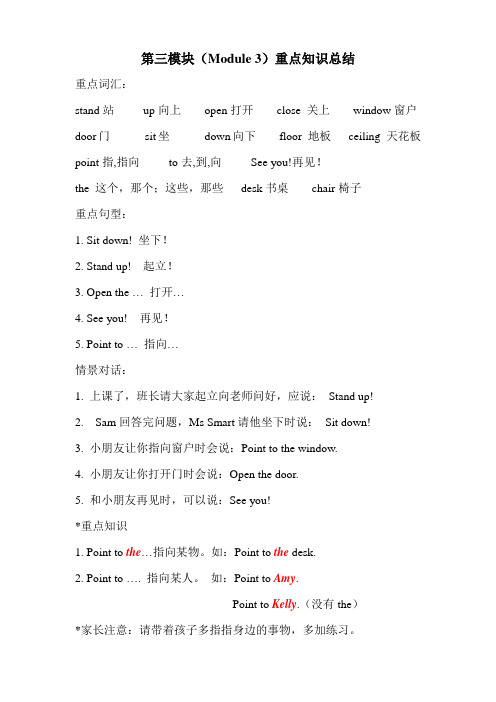
第三模块(Module 3)重点知识总结
重点词汇:
stand站up向上open打开close 关上window窗户door门sit坐down向下floor 地板ceiling 天花板point指,指向to去,到,向See you!再见!
the 这个,那个;这些,那些desk书桌chair椅子
重点句型:
1. Sit down! 坐下!
2. Stand up! 起立!
3. Open the …打开…
4. See you! 再见!
5. Point to …指向…
情景对话:
1. 上课了,班长请大家起立向老师问好,应说:Stand up!
2. Sam回答完问题,Ms Smart请他坐下时说:Sit down!
3. 小朋友让你指向窗户时会说:Point to the window.
4. 小朋友让你打开门时会说:Open the door.
5. 和小朋友再见时,可以说:See you!
*重点知识
1. Point to the…指向某物。
如:Point to the desk.
2. Point to …. 指向某人。
如:Point to Amy.
Point to Kelly.(没有the)
*家长注意:请带着孩子多指指身边的事物,多加练习。
外研版一年级起点第三册重点词组和句子

第三册重点词组和句子:e on 加油2.fly a kite 放风筝3.ride a bike 骑自行车4.fly my kite放我的风筝5.ride my bike骑我的自行车6.play football踢足球7.play basketball打篮球8.at a party在(一个)聚会上9.this shirt这件衬衫10.these shoes这双鞋11.these trousers这条裤子12.these clothes这些衣服13.get up 起床14.go to school 上学15.have lunch 吃午餐16.play football踢足球17.go home 回家18.go to bed 上床睡觉19.on Sundays在星期天20.at the park 在公园21.go to the park去公园22.in the sky在天上23.big city大城市by bike骑自行车24.by car坐小汽车 by bus乘公共汽车25.by train乘火车26.by ship / by boat乘船27.walk to school走着去学校28.go to work上班29.on holiday度假30.go to the zoo去动物园31.go to the farm去农场32.go to Beijing去北京33.go to China 去中国34.this weekend这个周末35.at the weekend在周末36.Have a good weekend!周末愉快!37.watch TV 看电视→ watches TV38.read books→reads boo ks 读书39.go swimming→goes swimming 去游泳40.play with Amy 和Amy一起玩41.play the piano 弹钢琴42.listen to music听音乐43.listen to CDs 听光盘.44.play the drums敲鼓45.It’s spring. 现在是春天。
小学英语外研版(一年级起点)三年级上知识点总结(彩色完全版)

小学英语外研版(一年级起点)三年级上知识点总结(彩色完全版)e to download the essential study materials:For students studying English using the Foreign Language Teaching and Research Press (FLTRP) n。
starting from Year1.Grade 3.the following is a summary of key knowledge points and phrases:1."Be hard for。
" means something is difficult for XXX.2."A knife and fork" refers to a set of cutlery.3."Be easy for。
" means something is simple for XXX.4."Fast food" refers to quick and XXX.5."XXX.6."Make a cake (for。
)" XXX.7."Good idea" XXX favorable.8."XXX" means to not make any noise.9."Go to your room" means to go to one's own bedroom.10."Play the piano" means to perform on a piano.11."Water the flowers" means to give plants water.12."Here you are" means to give something to XXX.13."Watch TV" means to view n programs.14."Do the homework" XXX.15."Make planes" means to create paper airplanes.16."Dragon boats" XXX.17."Over there" means a n that is not nearby.18."Get out/go out" means to leave a place.19."Run fast" means to move XXX.20."Jump far" means to leap a great distance.21."Look at" means to observe something.22."Have a XXX" XXX.23."Have a cake" means to eat a slice of cake.24."Have an ice cream" means to enjoy a scoop of ice cream.25."Go to the shop" means to visit a store.26."Have some sweets" means to eat some candy.27."Come in" means to enter a room or building.28."Don't worry" means to not be XXX.29."Row a boat" means to use oars to XXX.30."Write a letter" means to compose a message on paper.31."Have got" means to possess something.32."Has got" means the third person singular form of "have got."33."Play with。
外研版一年级起点三年级下册M3重点短语及知识点
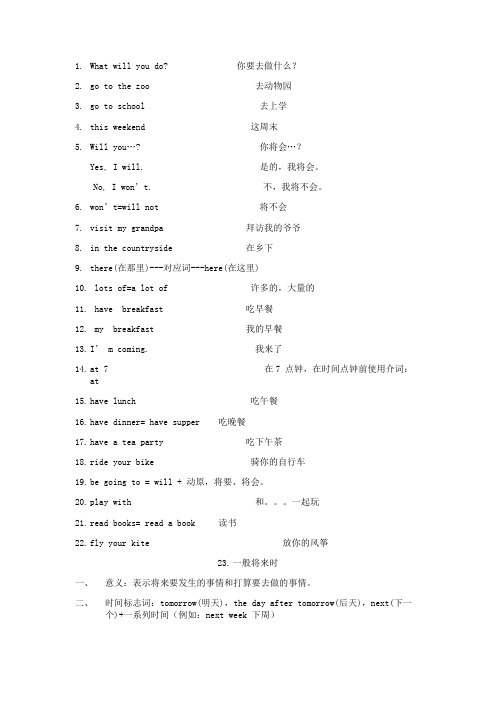
1.What will you do? 你要去做什么?2.go to the zoo 去动物园3.go to school 去上学4.this weekend 这周末5.Will you…? 你将会…?Yes, I will. 是的,我将会。
No, I won’t. 不,我将不会。
6.won’t=will not 将不会7.visit my grandpa 拜访我的爷爷8.in the countryside 在乡下9.there(在那里)---对应词---here(在这里)10. lots of=a lot of 许多的,大量的11. have breakfast 吃早餐12. my breakfast 我的早餐13.I’ m coming. 我来了14.at 7 在7 点钟,在时间点钟前使用介词:at15.have lunch 吃午餐16.have dinner= have supper 吃晚餐17.have a tea party 吃下午茶18.ride your bike 骑你的自行车19.be going to = will + 动原,将要、将会。
20.play with 和。
一起玩21.read books= read a book 读书22.fly your kite 放你的风筝23.一般将来时一、意义:表示将来要发生的事情和打算要去做的事情。
二、时间标志词:tomorrow(明天),the day after tomorrow(后天),next(下一个)+一系列时间(例如:next week 下周)三、构成:(一)含有will1.肯定句:主+will+动原+其他例如: I will go to the zoo.2.否定句:主+won’t+动原+其他例如:I won’t go to the zoo.3.一般疑问句:Will +主+动原+其他例如:Will you go to the zoo?Yes, I will. No, I won’t.。
【精编】小学英语超详细外研版(一年级起点)三年级上知识点归纳总结(彩色完全版)
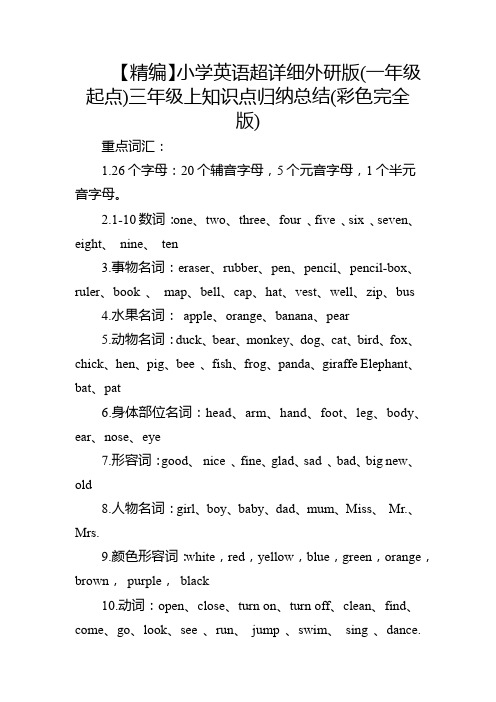
【精编】小学英语超详细外研版(一年级起点)三年级上知识点归纳总结(彩色完全
版)
重点词汇:
1.26个字母:20个辅音字母,5个元音字母,1个半元音字母。
2.1-10数词:one、two、three、four 、five 、six 、seven、eight、nine、ten
3.事物名词:eraser、rubber、pen、pencil、pencil-box、ruler、book 、map、bell、cap、hat、vest、well、zip、bus
4.水果名词:apple、orange、banana、pear
5.动物名词:duck、bear、monkey、dog、cat、bird、fox、chick、hen、pig、bee 、fish、frog、panda、giraffe Elephant、bat、pat
6.身体部位名词:head、arm、hand、foot、leg、body、ear、nose、eye
7.形容词:good、nice 、fine、glad、sad 、bad、big new、old
8.人物名词:girl、boy、baby、dad、mum、Miss、Mr.、Mrs.
9.颜色形容词:white,red,yellow,blue,green,orange,brown,purple,black
10.动词:open、close、turn on、turn off、clean、find、come、go、look、see 、run、jump 、swim、sing 、dance.
11.人称代词:I、you、he、she、it、we、you、they。
(word完整版)外研社三年级上册(一年级起点)复习知识点,推荐文档

三年级(一起)总复习★短语复习1.be hard for…对…来说很难2.a knife and fork 一副刀叉3.be easy for…对…来说很简单4.fast food 快餐5.ride my bike 骑自行车6.make a cake (for…)(为…)做蛋糕7.good idea 好主意8.be quiet 安静9.go to your room 回你的房间 10.play the piano 弹钢琴11.water the flowers 浇花 12.here you are 给你13.watch tv 看电视 14.do the homework做家庭作业15.make planes 制作飞机 16.dragon boats 龙舟17.over there 在那里 18.get out/go out 出去19.run fast 跑得快 20.jump far 跳得远21.look at 看 22.have a drink 喝一杯饮料23.have a cake 吃一块蛋 24.have an ice cream吃一块冰淇淋25.go to shop 去商店 26.have some sweets 吃一些糖e in 进来 28.don’t worry 别担心29.row a boat 划船 30 write a letter 写一封信31.have got 有 32.has got 有(第三人称单数形式)33.play with…和…一起玩 34.be careful 小心35.have/has got a headache/stomach ache/cold/cough有头痛/胃痛/感冒/咳嗽36.bring…to…带…到… 37.listen to music 听音乐38.be from=come form 来自 39.sports day 运动日40.do the long jump 参加跳远 41.do the high jump参加跳高42,run a race 参加跑步 43.play football 踢足球44.play basketball 打篮球 e on 加油46.at the airport 在飞机场 47.in the sea在海里48.on Friday 在周五 49.have a class 上课★重点句型复习:1.Do you use chopsticks in the UK ? Yes, I do./ No, I don’t.你在英国使用筷子吗?是的,我用。
最新外研版小学英语(一年级起点)三年级上册知识汇总

【外研版】小学英语(一起点)三年级上册知识汇总MOdUIe 1一、词汇餐具:ChoPStiCkS (常复)(筷子)fork (叉)knife (刀)食物:hamburger (汉堡包)ChiPS (常复)(炸薯条)其他:USe (使用)Want (想要)hungry (饥饿的)mess (肮脏f凌乱)hard (困难的)easy (容易的)grass (草)food (食物)二、习惯搭配三、惯用表达1. 询问对方是否想要某种食物:-DO you Want + 食物?-YeS f PleaSe. / NO f thanks.eg: 1. - DO you Want noodles?-YeS J PleaSe ・2. - DO you Want a hamburger and chips?-NO f thanks ・ I Want SOme noodles ・2. 询问对方是否使用某物:-DO you USe + 其他?-YeS f I / We do. /No, I / We don z t.eg: - DO you USe ChOPStiCkS in the UK?-NO f We don' t.3. 询问对方正在吃什么:-What are you eating?-Γ m eating + 食物.eg: - What are you eating?-Γ m eating noOdleS and meat.MOdUIe 2一.词汇make (制作)Cake (蛋糕)mum (妈妈)dad (爸爸)quiet (安静的,不出声的)Water (给(植物)浇水;水)IOVeIy (可爰的)二习惯搭配1.描述某人正在做某事:主语+ be动词(is/ am/ are ) +动词-ing +其他. eg: 1.1 am WatChing TV・2.A Cat is 「unning・3.We are making a Cake for you.2.询问对方正在做什么:-What are you doing?-Γ m +动词-ing +其他.eg: - What are you doing?-Γ m Playing the Piano.一.词汇名词:boat (小船,小舟)PeOPIe (人,人们)Iake (湖)bread (面包)形容词:naughty (淘气的)PaPer (制作的,纸质的)动词:feed (喂,为……提供食物)row (划)船二、习惯搭配三.重点句型1.询问"这些/那些是什么"的句型及其答语:-What are these/ those?-They are..・eg: 1. - What are these?-They are flowers・2.- What are those?-They are dragon boats・2.询问别人"打算去哪儿在某个时间"的句型及其答语:-Where are you going + 时间?-Γ m/ We r re going to + 地方.eg: 1. - Where are you going this afternoon?-Γ m going to the Cinema・2. - Where are you going tomorrow?- We f re going to the Park・一.单词缩写:can, t 二Can not 不能其他:L fa「远 2.fast快,快速地3.w inner胜利者4. SIOW慢的5.fly飞6.koala树袋熊;考拉7. Climb 爬8.cry 哭二、习惯搭配1.run fast跑得快2.jump far跳得远3.p lay football 踢足球4. Play basketball 打篮球5. in the Sky 在空中三、悽用表达LLet' S see!让我们看看!2.Help!救命!3.Ohno!哦,不!4.-Amy, Can you run fast?艾米,你能跑得快吗?-Yes,I can.是的,我能。
新标准一起点第三册知识汇总

新标准英语一起点第三册知识汇总Module 1主要单词:song歌曲jigsaw拼图bike自行车toy玩具主要句子:I like the ABC song. It`s my favourite song. Do you like ….? Yes, I do . / No, I don`t. What do you like ? I like ……运用任务:能运用字母表的顺序进行排序活动。
能运用核心句子介绍自己的爱好和询问别人的爱好。
活动建议:猜喜好将全班分成几个小组,然后分给各组四张纸,上面分别是事先写好的各种主题词汇。
各组中一名同学先从四张纸中抽取一张,如抽到的纸上写有颜色,被询问人需将答案写于纸后,大家则通过问Do you like …?来进行猜测。
每人有一次询问机会。
三次询问后,仍猜不中答案,需用What do you like ?进行最后询问。
猜中学生加一分,没被猜中学生加一分。
Module 2主要单词:T-shirt T恤衫mum妈妈dad爸爸too太small小的shirt衬衫at在party聚会clothes衣服trousers裤子shoe鞋主要句子:He/She likes……. He/She doesn`t like……..运用任务:能运用核心句子谈论别人服装方面的爱好。
学习难点:Sam likes……和Sam doesn’t like……什么时候动词需用加s学生分辨不清。
部分服装方面词的发音学生有困难。
如裤子、衣服、鞋等。
活动建议:1、对I like … I don`t like….. Do you like ….?复习应充分,重视由上面句子向核心句子转换的过渡设计(介绍自己--询问别人--介绍别人),以此保证学生对新知识的正确理解。
2、注意引导学生对新旧知识所呈现的语法知识的观察、对比、分析、归纳和总结。
3、通过设计情境进一步体会用法。
如:点菜活动或购物活动(屏幕上呈现各式各样的菜,一人是店员,一人是厨师。
外研版新标准一起三上英语重点知识

外研版新标准一起三上英语重点知识1.make a cake制作蛋糕2.water the plants给植物浇水3.a lovely day美好的一天4.XXX room安静的房间5.my mum我的妈妈6.my dad我的爸爸三、重点句型1.询问对方正在做什么:What are you doing?I’m +动词ing.eg:-What are you doing?I’m making a cake.2.询问对方家庭成员:Who’s in your family?My +家庭成员.eg:-Who’s in your family? My mum and dad.3.描述某人或物品:He / She is +形容词.eg:-Who is that girl? XXX.4.描述某地方:It’s +形容词.eg:-What’s your room like?It’s quiet.1.Make a cake.2.Make a XXX.3.Ride my bike.4.Water the flowers.5.Play the piano.6.Watch TV.7.Play the drums.8.Be quiet!9.Play the flute.10.Here you are.三、重点句型1.描述某人正在做某事:主语 + be动词(is/ am/ are)+动词-ing +其他。
例如:1.I am watching TV.2.A cat is running.3.We are making a cake for you.2.询问对方正在做什么:What are you doing?”I’m +动词-ing +其他。
”例如:What are you doing?”I’m playing the piano.”外研(一起)三年级上册Module 3知识汇总一、词汇名词:boat(小船,小舟)、people(人,人们)、lake (湖)、bread(面包)形容词:naughty(淘气的)、paper(制作的,纸质的)动作:feed(喂,为……提供食物)、row(划)船二、惯搭配1.Get out(走开,离开)2.Dragon boat(龙舟)3.Water the flowers(浇花)4.Row a boat(划船)5.Feed the ducks(喂鸭子)6.Play hide-and-seek(玩捉迷藏)三、重点句型询问“这些/那些是什么”的句型及其答语:What are these(这些)/ those(那些)?”They are…”例如:What are these?”They are flowers.”What are those?”XXX.”外研(一起)三年级上册Module 4知识汇总一、单词动作:fly(飞)、climb(爬)、cry(哭)形容词:slow(慢的)其他:far(远)、fast(快,快速地)、koala(树袋熊;考拉)、winner(胜利者)缩写:can’t = can not(不能)二、惯搭配1.跑得快:run fast2.跳得远:jump far3.踢足球:play football4.打篮球:play basketball5.在空中:in the sky三、重点句型1.表达能力:我能……I can +动词原形(+其他)。
外研(一起)Module3 重点短语,句子总结及检测
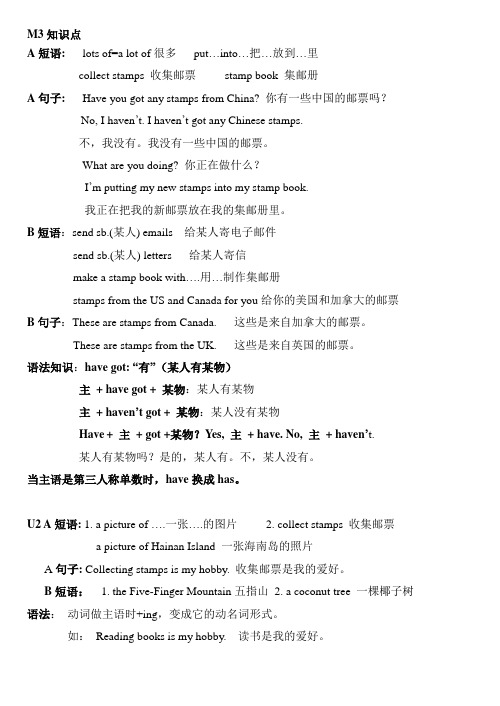
M3知识点A短语: lots of=a lot of很多put…into…把…放到…里collect stamps 收集邮票stamp book 集邮册A句子: Have you got any stamps from China? 你有一些中国的邮票吗?No, I haven’t. I haven’t got any Chinese stamps.不,我没有。
我没有一些中国的邮票。
What are you doing? 你正在做什么?I’m putting my new stamps into my stamp book.我正在把我的新邮票放在我的集邮册里。
B短语:send sb.(某人) emails 给某人寄电子邮件send sb.(某人) letters 给某人寄信make a stamp book with….用…制作集邮册stamps from the US and Canada for you给你的美国和加拿大的邮票B句子:These are stamps from Canada. 这些是来自加拿大的邮票。
These are stamps from the UK. 这些是来自英国的邮票。
语法知识:have got: “有”(某人有某物)主+ have got + 某物:某人有某物主+ haven’t got + 某物:某人没有某物Have+ 主+ got +某物?Yes, 主+ have. No, 主+ haven’t.某人有某物吗?是的,某人有。
不,某人没有。
当主语是第三人称单数时,have换成has。
U2 A短语: 1. a picture of ….一张….的图片 2. collect stamps 收集邮票a picture of Hainan Island 一张海南岛的照片A句子: Collecting stamps is my hobby. 收集邮票是我的爱好。
B短语: 1. the Five-Finger Mountain五指山2. a coconut tree 一棵椰子树语法:动词做主语时+ing,变成它的动名词形式。
- 1、下载文档前请自行甄别文档内容的完整性,平台不提供额外的编辑、内容补充、找答案等附加服务。
- 2、"仅部分预览"的文档,不可在线预览部分如存在完整性等问题,可反馈申请退款(可完整预览的文档不适用该条件!)。
- 3、如文档侵犯您的权益,请联系客服反馈,我们会尽快为您处理(人工客服工作时间:9:00-18:30)。
第三册重点词组和句子:
e on 加油
2.fly a kite 放风筝
3.ride a bike 骑自行车
4.fly my kite放我的风筝
5.ride my bike骑我的自行车
6.play football踢足球
7.play basketball打篮球
8.at a party在(一个)聚会上
9.this shirt这件衬衫
10.these shoes这双鞋
11.these trousers这条裤子
12.these clothes这些衣服
13.get up 起床
14.go to school 上学
15.have lunch 吃午餐
16.play football踢足球
17.go home 回家
18.go to bed 上床睡觉
19.on Sundays在星期天
20.at the park 在公园
21.go to the park去公园
22.in the sky在天上
23.big city大城市by bike骑自行车
24.by car坐小汽车 by bus乘公共汽车
25.by train乘火车
26.by ship / by boat乘船
27.walk to school走着去学校
28.go to work上班
29.on holiday度假
30.go to the zoo去动物园
31.go to the farm去农场
32.go to Beijing去北京
33.go to China 去中国
34.this weekend这个周末
35.at the weekend在周末
36.Have a good weekend!周末愉快!
37.watch TV 看电视→ watches TV
38.read books→reads boo ks 读书
39.go swimming→goes swimming 去游泳
40.play with Amy 和Amy一起玩
41.play the piano 弹钢琴
42.listen to music听音乐
43.listen to CDs 听光盘.
44.play the drums敲鼓
45.It’s spring. 现在是春天。
46.It’s warm. 天气暖和.
47.in spring在春天
48.It’s summer. 现在是夏天
49.It’s hot. 天气热.
50.in summer在夏天
51.It’s autumn. 现在是秋天。
52.It’s cool. 天气凉爽.
53.in autumn.在秋天
54.It’s winter. 现在是冬天。
55.It’s cold. 天气很冷.
56.in winter.在冬天
57.Happy New Year! 新年快乐!
58.at Chinese New Year 在春
59.eat dumplings 吃饺子
e in进来
61.in the UK 在英国
62.Christmas tree圣诞树
63.Christmas present圣诞礼物
What do you like? 你喜欢什么?I like your kite.我喜欢你的自行车。
Let’s ride my bike. 咱们骑我的自行车。
Let’s fly my kite.咱们放我的风筝。
Let’s play together.咱们一起玩吧。
Noodles for you, Tom. 给你面条. Meat for you, Sam.给你肉。
Sweets for you! 给你糖. Sweets are for good boys.糖是给好孩子的.
An ice cream for you!给你冰淇淋! A present for you.给你的礼物.
What are these? 这些是什么?They are dumplings. 它们是饺子.
I don’t like noodles.我不喜欢面条. I don’t like meat.我不喜欢肉.
I don’t like ginger and onions! 我不喜欢姜和洋葱。
I like sweets.我喜欢糖. I like rice. 我喜欢米饭. I like meat. 我喜欢肉.
I like milk .我喜欢牛奶。
I like fruit milkshake. 我喜欢奶昔
I like dumplings. 我喜欢饺子!
Do you like bananas?你喜欢香蕉吗?Do you like apples? 你喜欢苹果吗?
Do you like milk? 你喜欢牛奶吗?Do you like oranges? 你喜欢桔子吗?
What’s that?那是什么?It’s s fruit milkshake.它是奶昔。
Here you are.给你。
It’s their favourite. 它是他们最喜欢的。
It’s my favourite, too.它也是我最喜欢的
Sam’s at a party。
萨姆在一个聚会上。
He doesn’t like these clothes。
他不喜欢这些衣服
I get up at 7 o’clock.= At 7, I get up . 我在7点起床。
What do you do on Sundays?你在星期天做什么?I play football.我玩足球。
Where do you play football?你去哪里玩足球?At the park.在公园。
I like swimming and basketball. 我喜欢游泳和篮球(运动)。
Where do you live?你在哪里居住?I live in Beijing.我住在北京。
Beijing is a very big city. 北京是一个非常大城市。
What school do you go to?你上什么学校?I go to Qianmen School.我去前门学校。
Is it a big city?它是一个大城市吗?
How do you go to school?你怎样去上学?
I go to school by bus.我乘坐公共汽车去上学。
How about your father?你爸爸呢?
He goes to work by bike。
他骑自行车去上班。
Do you go to school by car?你乘小汽车去上学吗?
He goes by bus with my mother. 他和我妈妈乘公交车去。
Where's your school? 你的学校在哪?
My school is at the zoo. 我的学校在动物园.
I go to Dalian on holiday.我去大连假期.
I go by ship.我乘船去.
Do you go to Dalian by ship?你乘船去大连吗?
We love China.我们爱中国。
My mother watches TV on Sundays. 我妈妈在星期天看电视。
My mother goes swimming on Sundays. 我妈妈在星期天去游泳。
Do you play football at the weekend? 你周末玩足球吗?
She goes swimming.她去游泳。
She watches TV and she reads books.她看电视和读书。
这个周末来和Amy一起玩!Come and play with Amy this weekend!
我们穿外套和戴手套。
We wear coats and gloves.
我们不穿衬衫。
We don’t wear shirts.
We eat dumplings at Chinese New Year. 在春节我们吃饺.
They are firecrackers.它们是鞭炮
Are these for my hair? 这些是给我的头发吗?
We have firecrackers at Chinese New Year! 在春节我们有/放鞭炮了!
In England, we have Christmas. 在英国,我们有圣诞节。
Christmas is in winter. 圣诞节在冬天。
We have Christmas trees and Christmas presents. 我们有圣诞树和圣诞礼物。
我们吃大餐和唱歌。
We have a big dinner and sing songs.。
